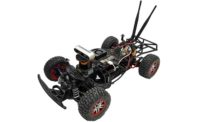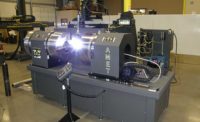Increasingly, manufacturers are learning that artificial intelligence (AI) can provide them with actual benefits. One of those manufacturers is Gestamp Automocion, a global designer and producer of metal components (chassis, bodies and mechanisms) for automobiles.
Founded in 1997, Gestamp is based in Madrid, and it operates more than 100 production plants and 13 research and development centers in 22 countries. The plants are located in western and eastern Europe, North and South America, and Asia. Assembly processes performed at these facilities include laser welding; hot, cold and, high-strength steel stamping; roll forming; and hydroforming.
From April 2018 to October 2019, Gestamp cooperated with Toshiba Digital & Consulting Corp. (TDX) in a unique project facilitated by Mitsui & Co. Ltd., an investor in both companies. Engineers from Gestamp and TDX worked closely on the proof-of-concept initiative, which involved monitoring and analyzing the quality of welds in chassis parts produced at a Gestamp plant in the United Kingdom.
The participants drew upon their know-how from the Industrial Internet of Things (IIoT) and AI, as well as data from camera images and acoustic emission sensors. All of this information enabled the companies to more precisely detect and measure weld joint quality, which will help improve vehicle safety.
Because acoustic emission sensors detect acoustic waves in the high-frequency band, they are typically used to test for damage in bridges and large buildings. But, this project represents the first time that the sensors were used in a manufacturing process.
After completing the project, Gestamp pilot tested the advanced welding technology at one of its plants in Germany from fall 2019 to this past March. Company testing validated the process, and now Gestamp expects it to increase the precision of welding quality detection on the assembly line, enable deployment at other Gestamp factories, and accelerate efforts toward full-scale commercialization.
This project is one of several that Gestamp is undertaking as part of its Industry 4.0 initiative. All of the projects involve using digital technology and data analysis to create more-efficient manufacturing plants, and more consistent and reliable production processes.
Tokyo-based TDX, meanwhile, has been working with Toshiba Digital Solutions Corp. to further improve welding detection and more quickly identify welding failures. The companies have achieved this by using Toshiba Digital’s AI technology SATLYS to carefully analyze the project’s emission-sensor data (regarding internal welding quality detection) and
camera-image data (regarding surface welding quality detection).
Introduced in October 2017, SATLYS is a cyber-physical system that performs simulations for companies using real-world data obtained via the IIoT. SATLYS is based on the Toshiba Group’s extensive knowledge of manufacturing and digital technologies in fields as diverse as societal infrastructure, semiconductors and electronic devices.
Another Toshiba company, Toshiba Inspection Solutions Co. Ltd, makes the Matrixeye 3D ultrasonic system for spot welding. The system measures many weld points in a part before using a synthetic aperture method to produce a high-definition 3D image of the part. It then simultaneously displays the image and accurately determines whether each weld passes or fails inspection.
For more information on AI analysis technology, call 408-526-2784 or visit www.toshiba-sol.co.jp/en.





